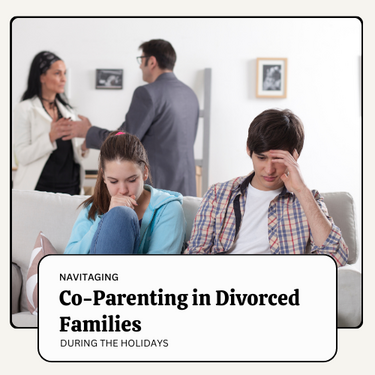
Divorced Parents and Holidays
Navigating any holiday or special events as a divorced parent is understandably difficult. Especially with all the glowing moments social media showcases, it can be easy to let the overly filtered posts get to you. The truth is that not every marriage is a happy one, and the holidays are hard for a lot of people.
Fortunately, managing holiday arrangements successfully as a divorced parent is possible, but it requires compromise and communication.
Here are five suggestions for co-parenting during the holidays after a divorce:
1. Put the children first.
Instead of prioritizing your preferences, focus on what is best for your children and realize that what is best for them is to NOT have parents fighting over them. Remember that in a divorce if either parent “wins” it can often mean the child(ren) lost.
Co-parenting tip: If you catch yourself in a dispute with your partner over holiday custody arrangements, consider temporarily relenting or calling a truce. For example, “I refuse to play tug of war with the children. We’ll take turns and you can go this year, but next year it will be my turn.”
2. Communicate with your co-parent directly.
Do not let your children become your spokesperson or a conduit of communication between you and your co-parent.
Coordinating schedules and making plans can be stressful for divorced parents, particularly when there has been ongoing conflict or a messy breakup. However, children should never act as the parents’ messengers. Make it a priority to come up with a mutually agreed upon plan with your co-parent well in advance, instead of procrastinating on holiday arrangements.
Co-parenting tip: It is ok to ask general, open-ended questions such as “What was the best part of your week?”, but do not interrogate your children about their time with the other parent.
3. Encourage your children to have a positive relationship with the other parent.
Don’t put them in a position of having to choose between co-parents.
It is not fair to make children or teens voice loyalty to one parent over the other, as that will only leave them feeling guilty for loving either parent. If there is enough good will for the holidays to overlap even for a few hours, your children will likely appreciate having both parents in the same room. But if you and your co-parent cannot be in the same room without arguing, then abide by the custody arrangement and do not make last minute changes.
Co-parenting tip: If your child is younger than 12, it is emotionally easier for the parents to choose where they will go and with whom they will spend the holiday with. If your children are teenagers, it’s ok to involve them in some of the planning if both parents agree this is acceptable. Sometimes older children have events they want to participate in with school or their peers that can make the transition from one parent to another challenging. However, do not “guilt trip” them for their choices.
4. Avoid petty competition over presents.
If you can, try to collaborate with your child’s other parent on presents so that there is no competition or duplication with gift giving. Communicate with your co-partner and divvy up the gift list so that it is the child, and not a parent, who comes out ahead.
Co-parenting tip: Helping your child buy a present or make a card for the other parent sends a powerful message that the divorce really is between Mom and Dad, and the child can rest emotionally secure in their relationship with both parents.
5. Make new traditions.
When you are with your children it is generally a good idea to stay true to the favorite family holiday traditions as that can usher in comfort and a sense of stability, but as an adult, being absent from your children on a holiday can hurt. Resist the urge to wallow and self-isolate, and instead make new traditions. Find ways to celebrate and enjoy their transition back to your home.
Co-parenting tip: If you find yourself alone on a holiday, make a new tradition for yourself and do something that makes you feel good such as volunteering at a local shelter or food bank, engaging in an activity you enjoy, or going on a trip.
Final Thought: Put your children’s needs above everything else.
Adulting is hard, but so is being a child or teen of divorced parents. Remember, it’s your job to be the responsible, adult, even when you don’t feel like it-parents are the adults, not the children. Therefore, parents and not children, should be the ones to make sacrifices and compromises, without announcing them to the children. Remember the goal of every special moment, vacation, or holiday is to allow children the opportunity to draw the conclusion that the world is a wonderful, safe, peaceful place and that moms and dads can handle whatever is going on.
Figuring out the holidays as a divorced parent is rarely ever easy, but do not lose heart. The year of “firsts” after a breakup, such as first holidays will likely be the hardest, and for most divorced couples, navigating the holidays as a divorced parent does get easier with time.
Are you and your co-parent on the same page about the holidays? Have a co-parenting question? Or is your child struggling to process your divorce?
*Disclaimer: The information on this website does not, and is not intended to, constitute legal advice; all information and content within this article and blog is meant for general information only. It is not a substitute for professional legal advice. No content on this site should ever be used as a substitute for direct legal advice.

Sign up for our newsletter to get instant access to parenting resources sent directly in your inbox!
